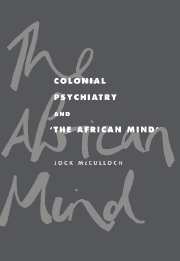Book contents
- Frontmatter
- Contents
- Acknowledgements
- 1 Introduction
- 2 Psychiatry and colonial practice
- 3 Some contemporary reviews of colonial mental health systems
- 4 Towards a theory of the African mind
- 5 Theory into practice: Carothers and the politics of Mau Mau
- 6 African intelligence, sexuality and psyche
- 7 The African family and the colonial personality
- 8 The elements of orthodoxy
- 9 From psychiatry to politics
- 10 Conclusion
- Notes
- Bibliography
- Index
6 - African intelligence, sexuality and psyche
Published online by Cambridge University Press: 04 December 2009
- Frontmatter
- Contents
- Acknowledgements
- 1 Introduction
- 2 Psychiatry and colonial practice
- 3 Some contemporary reviews of colonial mental health systems
- 4 Towards a theory of the African mind
- 5 Theory into practice: Carothers and the politics of Mau Mau
- 6 African intelligence, sexuality and psyche
- 7 The African family and the colonial personality
- 8 The elements of orthodoxy
- 9 From psychiatry to politics
- 10 Conclusion
- Notes
- Bibliography
- Index
Summary
Clinical psychologists have long been especially interested in what Francis Galton called the ‘serviceable citizen’. In other words they have sought to identify the limits of human nature. These limits have often been pursued negatively: in research conducted in the first half of this century the absence of particular qualities, a certain modality of conscience, a facility for deferred gratification, a particular ability to plan, or a set of attitudes towards the body in women, criminals or ‘primitives’ was taken as proof of their lack of humanity.
There was little reason for clinical psychologists to take an interest in the intelligence of African peoples, and indeed during the colonial era little research was conducted. What white employers required of blacks was physical drudgery; segregationist policies ensured that skilled work was reserved for Europeans. Stanley Porteus did work briefly among the Bantus of Southern Africa, but his African research was peripheral to his research on the Australian aborigines and the ethnic minorities of Hawaii. By 1940 South Africa had its own intelligence-testing industry, and a number of specialists were working on the subject of African mentality. The best known of the South African researchers was a psychologist named Simon Biesheuvel who during World War II was officer in charge of the aptitude-test section of the South African Air Force. Biesheuvel was also a founder and director of the National Institute for Personal Research, which was part of the Department of Defence, and aimed at improving industrial efficiency.
- Type
- Chapter
- Information
- Colonial Psychiatry and the African Mind , pp. 77 - 90Publisher: Cambridge University PressPrint publication year: 1995



